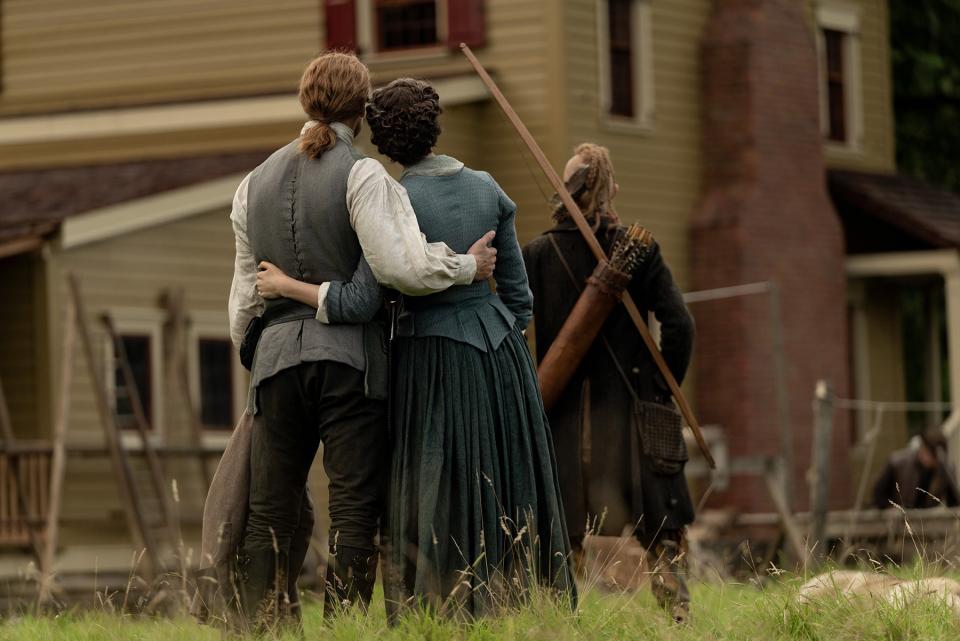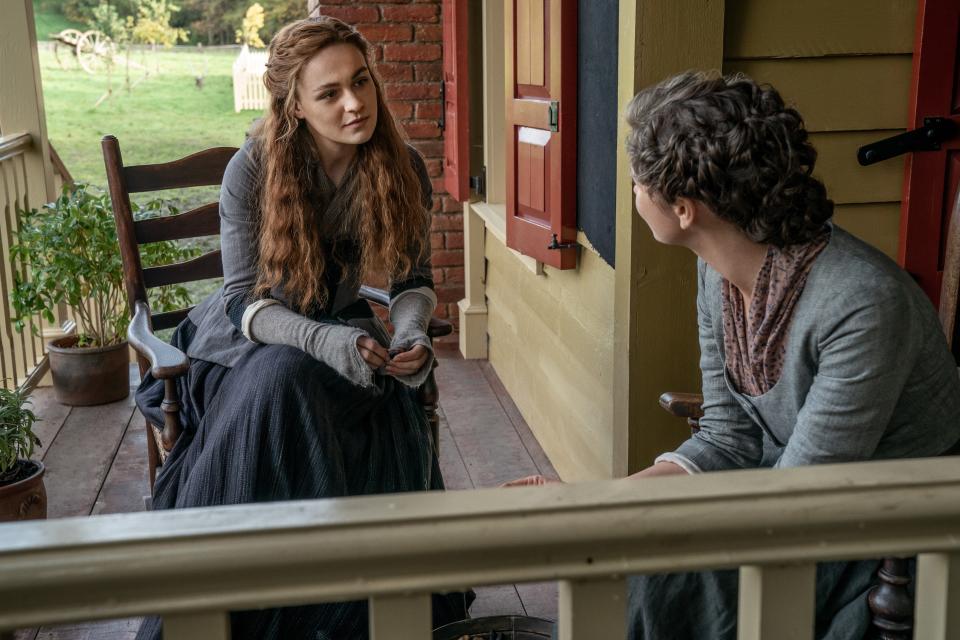Caitriona Balfe and Sophie Skelton Discuss Outlander ’s Devastating Season 5 Finale
Warning: Contains spoilers for the finale of Outlander season 5.
This season, we’ve seen numerous compelling storylines: Jocasta getting married, the death of our beloved Murtagh, Roger almost losing his life, and the villainous pirate Stephen Bonnet finally getting what he had coming to him. But while Outlander remains an addictively plotted show, that doesn’t mean it’s easy to watch. “I keep saying just because there’s a bullet in Bonnet, it doesn’t mean that the problem has gone away,” notes Sophie Skelton, who plays Brianna MacKenzie, of the Frasers’ season 5 antagonist. And there has been perhaps no more challenging episode than the season’s finale, which aired on Sunday night. “[The finale] is brutal,” Skelton says. “I feel bad that we’re leaving people in isolation with this ending.”
In one moment towards the end of the season, we see much suffering and sorrow. Jamie is on his deathbed with a high fever—though he’s quite literally pulled back to life by Claire’s healing touch. Not too long after, the Frasers’ neighbor Lionel Brown discovers that Claire has been distributing medical information, like how to prevent pregnancy, under the pseudonym Dr. Rawlings. Claire then experiences an extraordinarily cruel fate at the hands of a group of vile men, largely because she’s a self-possessed woman operating in a world where women aren’t viewed as much more than property, and science isn’t to be trusted. It’s a harrowing ordeal that’s sure to have many viewers looking away—and perhaps reignite old questions of the show’s use of sexual violence as plot point.
Caitriona Balfe, who plays Claire, acknowledges that there is a lot of sexual violence in Outlander, and notes also that its recurrence in the show is based on how prevalent it likely was in the 1800s. “That is something that we have to reckon with as a show. Sexual violence when used as a weapon is still incredibly prevalent today. One of the saddest things about this lockdown is that you’re hearing about these soaring rates of sexual violence and abuse,” she says. “One in four women will probably experience some kind of sexual assault throughout their lifetime, and that’s an insane statistic. I think that it is unfortunate that it’s so much a part of our story. But I also think that we try to add something positive to that conversation as much as we possibly can. I feel like what we dealt with in season 1, showing a male rape, which is rarely ever discussed or shown, that was a brave and bold way to handle that. We try very hard not to empower the rapists.”
While Claire’s ordeal is challenging to watch, viewers know that in our time, ignorant men continue to respond to women in power in dangerous ways—just take armed anti-lockdown protestors entering the Capitol this week following Governor Gretchen Whitmer’s strict stay-at-home mandate. “I think selfishness and ignorance sometimes go hand in hand, and you see it with the Browns, and people who are unwilling to think past their own experiences,” Balfe says. “Lionel Brown is all about what is affecting him at any moment in his life, and Dr. Rawlings has threatened his very selfish comforts. I think anyone who is out there protesting with army grade weapons against something that is for the public health also can’t think past their own selfish needs, and it’s a shame.”
The show deals with the assault in a surprising fashion. “We took a big risk with the finale,” Balfe says. “This is not always the type of scenario that you relish. We do try and follow the storylines from the book as basically as we can. And when they first started talking about bringing this forward, [we] talked about this idea of not staying with Claire during the rape and going to this other place—a disassociative state. I thought, That’s an interesting and slightly educational way that we can approach this, and do something that has a point of view that’s empowering and respectful. I love this idea that Claire gets spoken about as being a strong female character. But when people experience things like this, there is no ‘strong way’ of getting through it. There are many different ways that people respond. I liked the idea that we show Claire…not being typical. It’s a very difficult thing to go through. Her response to it was unexpected, and I thought the ways we approached it were empowering to the character.”

Outlander Season 5 2020
Robert WilsonAfter such a trauma, one might wonder why Claire doesn’t just return to her own time to recover as much as she can from this atrocity. “For Claire, this is home now,” Balfe says. “And I think for everybody, no matter what happens in your life, there is that small part of you that knows that home is safety. And even if people try to take that away from you, you will slowly try to rebuild that, because that’s the only thing that gives any of us any grounding, and it’s going to take some time but she has her family around and that will be the key to her recovery.”
Skelton thinks the finale, while searingly emotional, reflects the realities of processing horrific circumstances—that it may not be linear or predictable. “Claire deals with it in a very different way than Brianna,” she says, referring back to her character's assault in season 4. “Claire talks about it, while Brianna kept it to herself for a while. Claire wants to tell herself that she’s going to be super resilient and fine, and then she has a breakdown.”

Outlander Season 5 2020
Aimee SpinksYet the episode is also a powerful reminder about vulnerability and letting people help in troubled times: “I hope people keep in mind that you are seeing these characters flawed; you’re seeing them break down, and you’re seeing them not being able to handle things. I think especially during this time, when there is so much uncertainty right now with this pandemic, and people are home alone, or going through financial problems, it shows that it’s okay to not be okay, and if you want to talk to people, people will be there. I think especially of that line where Brianna says to Claire, ‘You have my hand and my ear if you need it.’ I think that’s such a loving moment, and it’s so true—just knowing that people are there for you if you need it, without you having to say too much...I hope people take a little bit of strength away from that.”
Originally Appeared on Vogue

